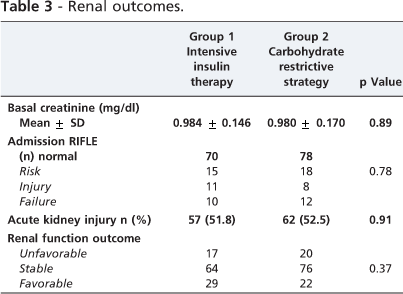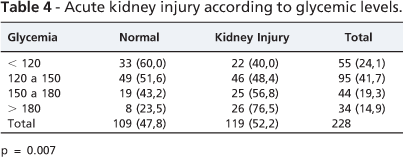OBJECTIVE: To compare the renal outcome in patients submitted to two different regimens of glycemic control, using the RIFLE criteria to define acute kidney injury. INTRODUCTION: The impact of intensive insulin therapy on renal function outcome is controversial. The lack of a criterion for AKI definition may play a role on that. METHODS: Included as the subjects were 228 randomly selected, critically ill patients engaged in intensive insulin therapyor in a carbohydrate-restrictive strategy. Renal outcome was evaluated through the comparison of the last RIFLE score obtained during the ICU stay and the RIFLE score at admission; the outcome was classified as favorable, stable or unfavorable. RESULTS: The two groups were comparable regarding demographic data. AKI developed in 52% of the patients and was associated with a higher mortality (39.4%) compared with those who did not have AKI (8.2%) (p<0.001). Renal function outcome was comparable between the two groups (p=0.37). We observed a significant correlation between blood glucose levels and the incidence of acute kidney injury (p=0.007). In the multivariate logistic regression analysis, only APACHE III scores higher than 60 were identified as an independent risk factor for unfavorable renal outcome. APACHE III scores>60, acute kidney injury and hypoglycemia were risk factors for mortality. CONCLUSION: Intensive insulin therapy and a carbohydrate-restrictive strategy were comparable regarding the incidence of acute kidney injury evaluated using RIFLE criteria.
Critical illness; Insulin; Hypoglycemia; Renal failure; Glycemic control





